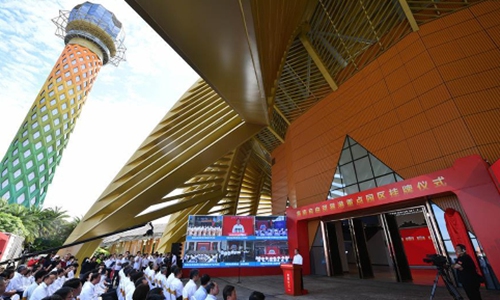Hainan obtains preferential taxation, investment policies to build a free trade port
Source:Global Times Published: 2020/6/8 14:43:24

Photo taken on June 3, 2020 shows the unveiling ceremony of key industrial parks, in Haikou, south China's Hainan Province. A batch of key industrial parks were unveiled on Wednesday in China's island province of Hainan, in an effort to promote the construction of the Hainan free-trade port. The 11 key parks around the island cover three major fields, including tourism, modern services and advanced technologies. China on Monday released the development plan for the Hainan free-trade port, aiming to build Hainan into a globally influential, high-level, free-trade port by the middle of the century. (Xinhua/Guo Cheng)
South China's Hainan Province will accelerate opening its financial services and services trade wider to overseas investors, as the central government has approved a plan to build the whole island into a free trade port, provincial officials told a press conference in Beijing Monday.
According to the outline of the plan, Hainan will encourage free flows of six elements: trade, investment, cross-border capital, personnel, transportation and data. Goods will be subject to zero tariffs within the island and the services trade will be allowed to operate in keeping to freer market competition rule.
"To open up the services industry we will greatly reduce barriers to market access in three sectors: tourism, modern services and high-tech," Hainan Governor Shen Xiaoming said, adding that key industrial sectors for development on the island include shipping, telecommunications, finance, medical care, education and sports.
Take telecommunications as an example, Hainan will be the the first province in China to open up its basic telecommunications sector to foreign investment in an orderly manner, Shen said. In other provinces, companies in basic telecommunications are required to have Chinese holdings.
The province will support the establishment of financial entities with either sole or partial ownership by overseas securities, futures and fund management institutions, and will allow foreign universities and vocational colleges specializing in science, agriculture and medicine to establish branches in Hainan, according to the governor.
Financial institutions including commercial banks will be encouraged to develop capacities suited to an open economy, and global exchanges for energy, shipping and bulk commodities will be supported, Pan Gongsheng, vice governor of the People's Bank of China, said at the press conference.
As a parallel supportive policy, China will formulate the first "negative list" for cross-border services trade within the year, Chinese Vice Minister of Commerce Wang Shouwen announced at the same press conference. It will become a bright spot of Hainan's institutional innovation, Wang added.
A negative list generally specifies areas which foreign investors are not allowed to enter.
Hainan has seen its actual-use foreign capital double for the past two consecutive years, with 444,000 new market entities, up 65 percent from April 13, 2018, when China approved the development of a free trade zone in the province.
Altogether, 572 investment projects have been started in Hainan, with a total investment of 582.8 billion yuan ($82.26 billion), according to Liu Cigui, CPC Party chief of Hainan.
Liu noted that Hainan is fully ready to implement free trade port policies as it has accomplished more than 97 percent of its tasks as a pilot free trade zone, according to an evaluation by the State Council inter-ministerial Joint Committee on the pilot free trade zone.
Before Hainan sets up a unique customs clearing system by 2025, four types of goods will be exempted from customs duties: means of production, raw material, vehicles and consumer goods within Hainan, said Shen.
For instance, tax on an imported yacht would be lowered by 38 percent, and 20 percent of the recreational equipment tax would be saved.
The tax-free shopping quota in Hainan will be increased from 30,000 yuan per person per year to 100,000 yuan, due to the favorable zero tariffs policy, said Zou Jiayi, China's vice finance minister.